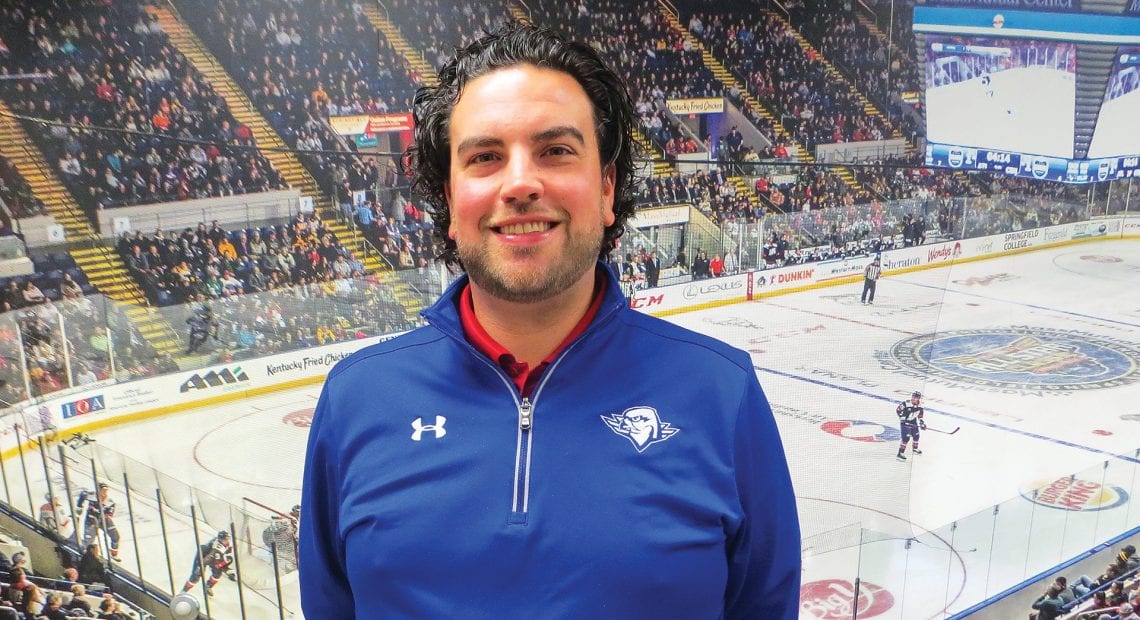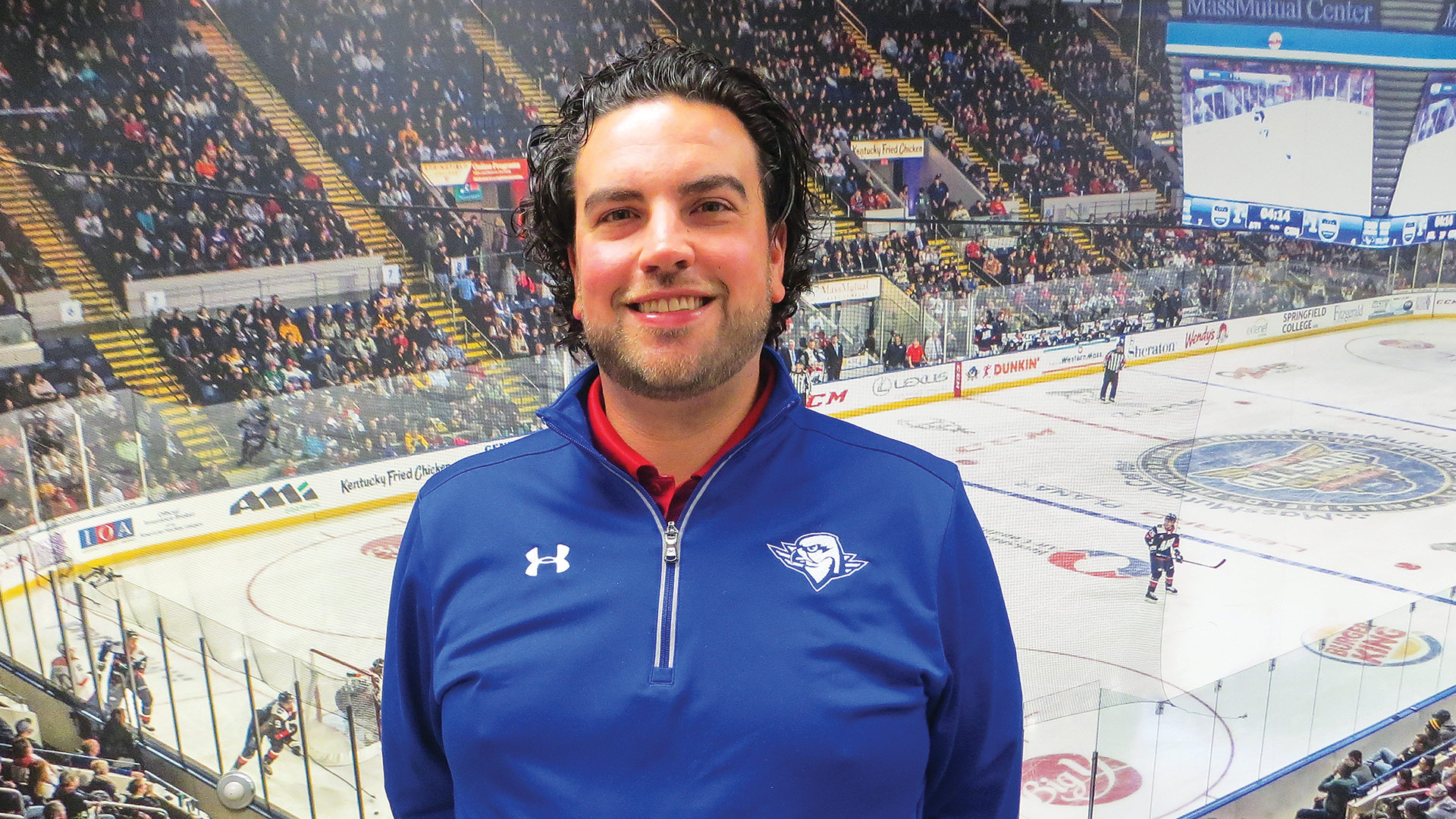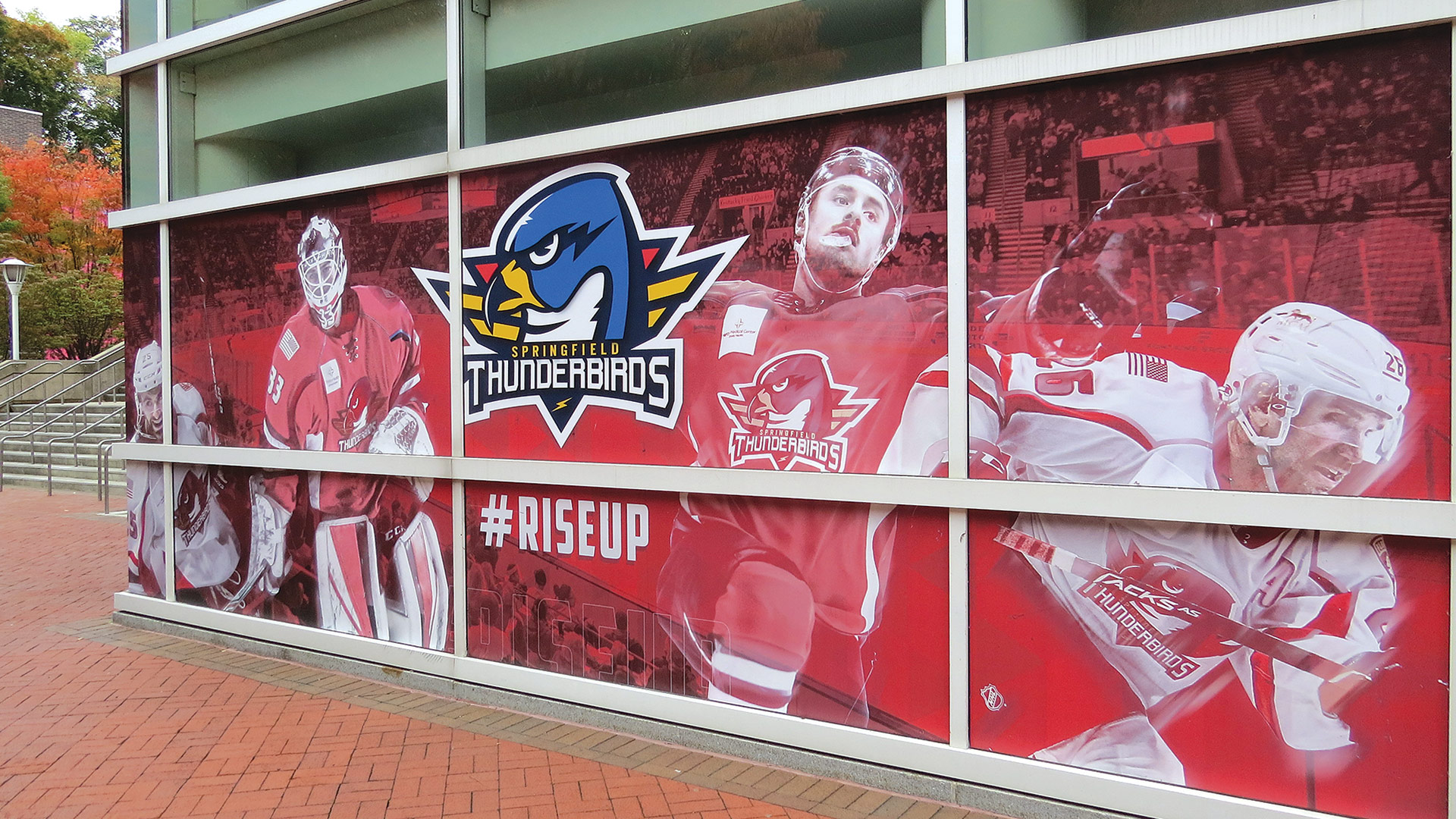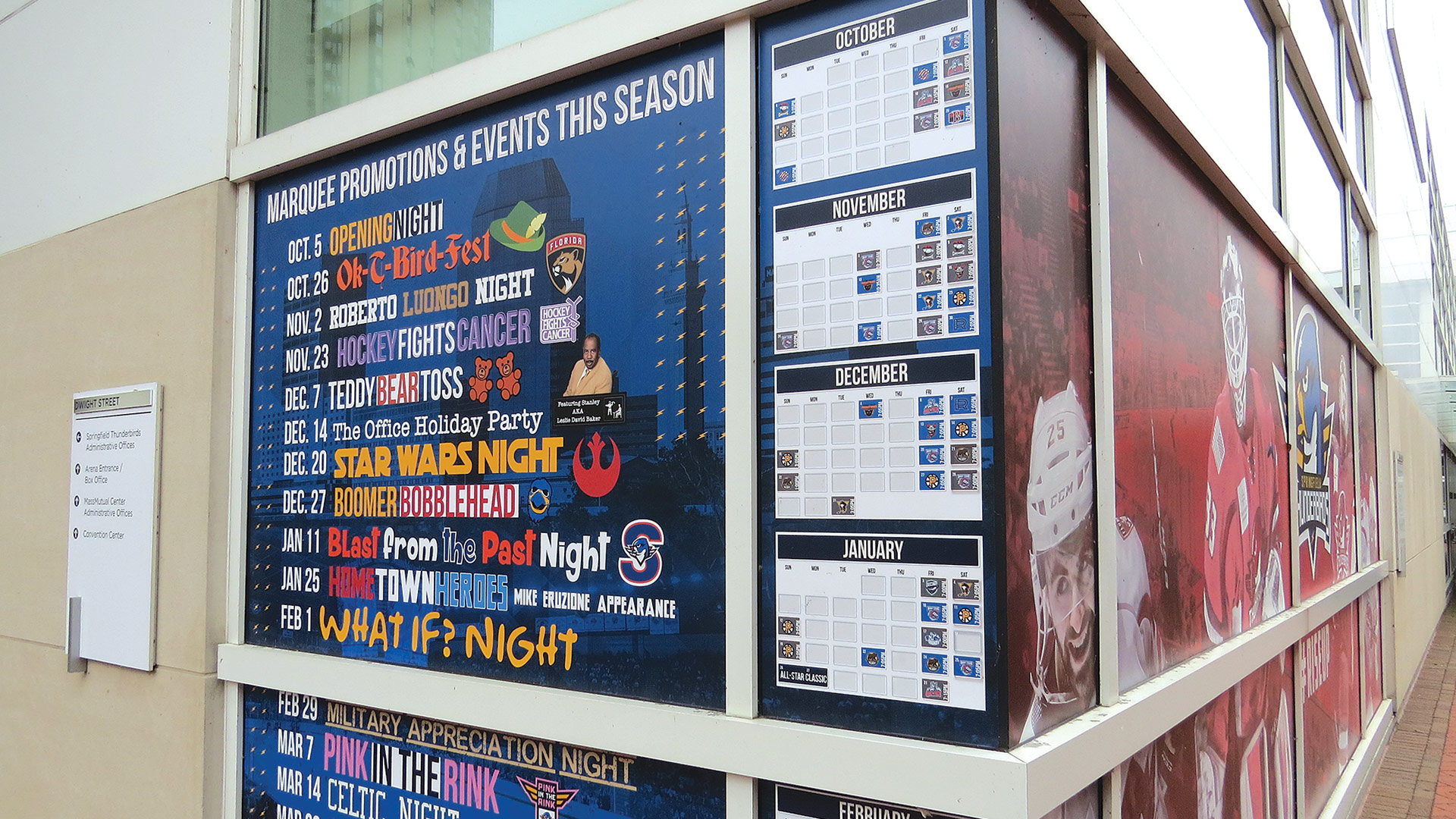
Amid Endless Questions and Challenges, Thunderbirds Plan for the Future
A Season on Ice

Nate Costa, president of the Thunderbirds
The wall opposite Nate Costa’s desk is covered in a wrap depicting action from the American Hockey League (AHL) All-Star Classic, played at the MassMutual Center in January 2019 — probably the high point of the five-year re-emergence, and renaissance, of professional hockey in Springfield.
Costa pointed toward that wall several times as he tried to explain just how the Springfield Thunderbirds, which he serves as president, might place spectators so they are at least six feet apart — if, and it’s mighty big if, the governor, the city, and whoever else might need to sign off on such a plan gives the proverbial green light. And he also pointed while talking about the many subtleties and challenges that go into such an exercise.
“It’s almost like a puzzle,” he explained. “We have 6,700 seats, and our season-ticket holders are typically jammed into the best seats. All our center-ice seats are completely taken … so what do you do in a six-foot distancing model? — everyone can’t get the seat they would normally want to have, and that’s just one of the challenges.”
As he talked with BusinessWest on Oct. 15, five days after the 2020-21 season was supposed to start, Costa acknowledged that trying to put together this puzzle is just one of the myriad questions and challenges he and a now considerably smaller staff are working to address.
“The ownership has given a commitment to Springfield — we’re not going anywhere. It’s going to be a challenging year for us, like it is for everyone else, but the commitment is there to get through this year and plan for the long term. We’ll get through this … it’s just going to be tough.”
Indeed, Costa admitted he has no real idea if or when he might be able to put such a plan into action. In reality, he has no idea when or under what circumstances hockey might again be played on Main Street. He was told in July by the National Hockey League, parent to the AHL, that games might be able to commence by early December, but he’s very doubtful about that date.
He believes January or even February is a far more likely start time. But beyond that, he cannot say with any degree of certainty how — and how many — games might be played, and how late into 2021 the season might go. Instead, there are only question marks — many of them, involving everything from if and how many fans can sit in the stands to if and how this team can travel to away games in other states, let alone Canada.
All these questions, most of them difficult if not impossible to answer at this juncture, make this a difficult, very frustrating time for Costa and all those involved with a franchise that had become one of the feel-good stories in Springfield over the past several years.

While the AHL is expressing hope that games might be played in early December, Nate Costa, president of the Thunderbirds, believes January or early February is a more likely target for a return to action at the MassMutual Center.
Under Costa’s stewardship and the backing of a large, committed ownership group, Springfield had gone from a city without hockey after the Falcons departed for Arizona more than five years ago, to one with a franchise that was not only filling the MassMutual Center with increasing regularity, but also becoming part of the fabric of the region.
Turning the clock back just seven months or so, although it seems like an eternity, to be sure, Costa said the team was clicking on all or most cylinders, meaning everything from ticket and merchandise sales to creating strong partnerships with a number of area businesses.
Listen to BusinessTalk with Nate Costa Podcast HERE
“We were, fortunately, in a really good position when the season ended last year,” he noted. “We were ahead of budget, we were on track to make a profit, which was three years in the making. We were in great shape — we had nine sellouts through March last year, which was our previous record, and we had three weekends left and were expecting three more sellouts. The business was in great shape.”
In the proverbial blink of an eye, though, everything changed. The season, and the MassMutual Center, were shut down. Initially, the Thunderbirds, like most businesses closed down by the pandemic, thought it might be a matter of several weeks before things went back to something approaching normal. As it became clear this wouldn’t be the case, the team — again, like many other businesses — had to make some hard decisions and eventually furlough several employees; once a staff of 19, it is now down to seven.
“The thing that has been frustrating and challenging — to everyone, but me in particular — is that we don’t have a lot of control over much of anything at this point. You’re beholden to the state and other states and also to the league … you can have all the best plans in the world, but if we don’t have the ability to do it and do it safely, then it’s going to be a challenge.”
Those who remain are trying to carry on as they did seven and half months ago — selling season tickets, planning events, working within the community, and building the team’s foundation. But it’s all different. For the most part, the staff is trying to prepare for contingencies, plan what can be planned, and, perhaps above all, work tirelessly to remain relevant while waiting for games to commence and the pandemic to run its course.
“The ownership has given a commitment to Springfield — we’re not going anywhere,” Costa said. “It’s going to be a challenging year for us, like it is for everyone else, but the commitment is there to get through this year and plan for the long term. We’ll get through this … it’s just going to be tough.”
Setting Goals
When asked about how he’s apportioning his time these days, Costa said he spends much of it on the phone.
Many of those calls are to and from other team executives in the AHL — he knows most of them going back to the days when he worked for the league — who are looking to compare notes and share thoughts on how to deal with a situation unlike anything they’ve encountered.
“I’m seeing what other teams are doing, what they’re hearing from their states, and what the temperature is for us to play in the upcoming year,” he explained. “There’s a lot of conversation going on about how we can pull this off and how we can do it the right way. It’s a challenge that none of us have faced in our careers, and there’s no way to really plan for it.”
In addition to other AHL officials, Costa and others within the league are also talking with leaders from other sports, including the National Football League. From these conversations, they’re learning it’s been difficult to sell even those comparatively few tickets that states like Florida, Texas, and Missouri are allowing teams to sell.
Indeed, while the popular notion might be that there is considerable demand for those few seats, and that teams would struggle to figure out who might be awarded them, that is certainly not the case.
“They’re having a hard time selling the limited inventory that they have because people are just not mentally ready for it yet,” Costa said. “Even the Cowboys are facing challenges; they’ve had to comp a lot of tickets. The Dolphins, the same thing. That’s what we’re seeing.”

Signage outside the MassMutual Center still displays the 2019-20 Thunderbirds’ schedule because the slate for this year remains clouded by question marks.
This harsh reality brings yet another layer of intrigue, and questions, to the discussion concerning just when, if, and under what circumstances the AHL might be permitted to carry out its 2020-21 season. Indeed, while the league wants to commence action and get fans back in the arenas, if they start too early, fans will not be eager to come back.
And the harshest reality of all is that this league — and the NHL as well — simply cannot operate for any length of time without fans in the stands.
The AHL is a league with no national television contracts and only some smaller, regional deals. The vast majority of revenues come from sponsorships and sales of tickets, concessions, and merchandise. And without fans in the stands … well, it’s easy to do the math.
Meanwhile, the inability to play in front of fans is also presenting a major challenge to the parent league, the NHL, whose franchises own the bulk of the teams in the AHL, with a dozen or so, including the Thunderbirds, being independently owned.
“Even though the perception is that the NHL is this huge entity that can just sustain losses, with them not having the ability to put fans in the stands, that impacts everything,” he explained. “That’s the trunk to the revenue tree. If you don’t have fans, it’s hard to sell sponsorships, and you can’t sell merchandise and concessions. And at our level, that’s what really drives our business — it’s butts in seats.
“In this league, it’s crucially important to have fans in the arena,” he went on. “And that’s what we spent four years doing — rebuilding the fan base and packing this arena so that our business would be much more financially solvent.”
But playing games without fans in the stands remains one of the options moving forward, said Costa, calling it a last resort, but still a possibility, especially if he can negotiate with one of the local TV stations to televise some of the games. And talks along those lines are ongoing, he told BusinessWest.
The hope, though, is that, by January or February, the state will allow fans in the arenas with a six-foot-distancing model, he said, referring again to that image on his wall.
“It’s not going to be a ton of people, maybe 1,200 to 1,500 people from what we’re doing with our modeling,” Costa continued. “But at least it would get us started, and then the hope would be that, as the spring would move along, we’d be able to bring more bodies into the building.”
That’s the hope. But Costa and his team, as noted, are preparing, as best they can, for a number of contingencies.
“The thing that has been frustrating and challenging — to everyone, but me in particular — is that we don’t have a lot of control over much of anything at this point,” he said. “You’re beholden to the state and other states and also to the league … you can have all the best plans in the world, but if we don’t have the ability to do it and do it safely, then it’s going to be a challenge.”
Knowing the Score
Next spring will mark the 50th anniversary of the Calder Cup championship run authored by the team known then as the Springfield Kings, the minor-league affiliate of the then-fledgling Los Angeles Kings.
Costa said the team has been making plans to honor that squad and its accomplishment with a throwback game featuring the Kings’ colors and logos, an on-ice ceremony featuring surviving members of that team, and other events.
Now, most of those plans, as well as those to mark the fifth anniversary of the Thunderbirds themselves, are in limbo, like just about everything else concerning the 2020-21 season.
Indeed, even as Costa and his team try to prepare for the new season, there are still so many things beyond their control, especially the virus itself. By most accounts, a second wave has commenced, with cases on the rise in a number of states. Some of those states, and individual communities, have already put a number of restrictions in place as part of efforts to control the spread of the virus, and there may be even more in the weeks and months to come.
The ones already in place create a number of logistical concerns.
“Rhode Island has a 14-day mandatory quarantine, so if we play Providence, how does that work?” he asked rhetorically. “Meanwhile, the Canadian border is closed; we have Canadian teams, including one in our conference, Toronto. And then, there’s the challenge of air travel — Charlotte is in our division, and we would normally go there once or twice a year. How do you do that, and how do you do it safely?
“There’s a lot of things that we as a league have to work through,” he went on, and while coping with these day-to-day questions and challenges, he stressed the need to think and plan for the long term. He said the pandemic will eventually be something to talk about with the past tense, and he wants to properly position the franchise for that day, even while coping with the present challenges.
This mindset has dominated the team’s actions with regard to everything from refunding tickets sold but not used last season to managing the partnerships that have been developed over the years with corporate sponsors.
“We reached out to every season-ticket holder and gave them a number of options,” he said in reference to the seven games they missed at the end of last season. “They could roll the credit over to the following year, they could donate to our foundation, or, if they didn’t want to do any of those, we would be happy to give them a refund because, at the end of the day, it’s the right thing to do.
“None of us planned for this, so from a business perspective, we thought that any sort of pushback or anything like that is not the way to be,” he went on. “We want to make sure we’re doing the right thing for the people who have supported us from the start, and we’ve been proactive and honest because, at the end of the day, it’s so important for us to be authentic through this process because we’re not the only ones dealing with this — everyone has their own challenges.”
This approach, coupled with the team’s strong track record over the past several years, has helped the organization maintain its strong base of support, said Costa, adding that the Thunderbirds have been able to retain roughly 85% of their season-ticket sales from last year, despite the question marks hovering over the upcoming season.
“It’s been incredible to see the level of support we’ve been given,” he said. “I think people were really seeing what we are able to do in the community and how much of an impact we were having. We’ve been given commitments by people that they’re going to be here when we’re back.”
Looking ahead to the day when the pandemic is over and he can once again focus on selling out the MassMutual Center, Costa is optimistic about his prospects for doing just that.
“I think it’s going to take some time — it might take until the summer for those people who aren’t diehards to come back to our arena, but I think that, by next fall, we’ll be able to pack this place again,” he told BusinessWest. “I think there’s going to be a lot of pent-up demand, and I think we’re positioned well. I think that, when people are ready to get back in the arena again, they’re going to think twice about driving to Boston and paying $300 to $400 for a ticket when they can get the same experience and see really good hockey right here in our area for a fraction of that price.”
Taking Their Best Shot
As he walked and talked with BusinessWest while showing off some of the many other wraps adorning the team’s offices on Bruce Landon Way, Costa stopped and reflected on the fact that last year’s schedule is still posted on the wall outside those facilities.
That schedule has become symbolic of how the NHL and the Thunderbirds have become frozen in time in some respects. No one can say when there will be new games on the slate, how the games will be played, or where.
What Costa does know is that, sometime soon — just when, he doesn’t know — there will be a new schedule in that space. Things will be different for some time to come, and the team is certainly not going to pick right up where it left off when the music stopped last March.
But he firmly believes that the solid foundation laid before the pandemic entered everyone’s lives has the team in a good place for when we’re all on the other side of this crisis.
George O’Brien can be reached at [email protected]





